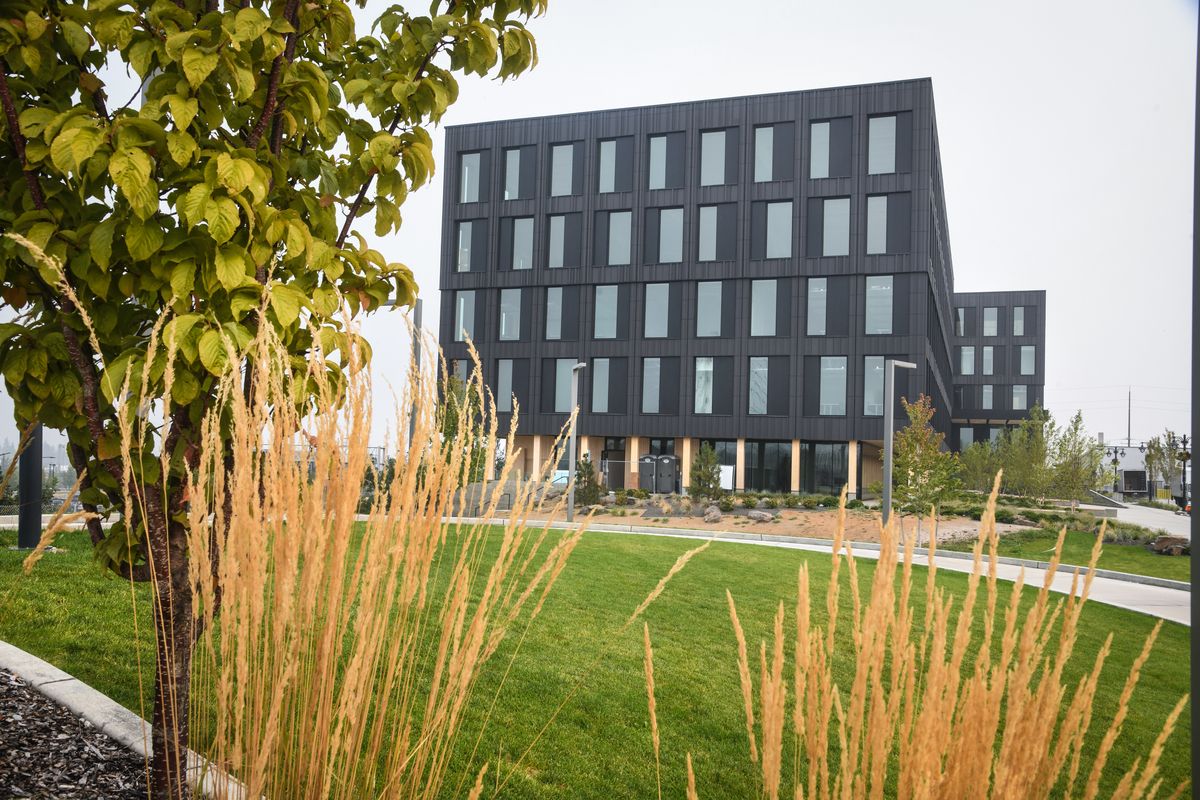Construction startup Katerra Inc. closes Spokane Valley plant, reportedly shutting down operations worldwide

Construction startup company Katerra Inc., which had been operating a 270,000-square foot manufacturing plant in Spokane Valley, has closed the production facility and laid off more than 60 employees this week.
Jason Herman, the general manager of the Spokane Valley facility, said Wednesday he could not elaborate on the closure but said all orders and deliveries from the cross-laminated timber manufacturing facility have ceased.
“I let all the factory employees go yesterday,” Herman said.
Asked how many lost their jobs, he said about 63.
Technology news site The Information reported Tuesday the California-based company is laying off hundreds of employees worldwide and is expected to walk away from dozens of construction projects it agreed to build, citing a person familiar with the matter.
Katerra aimed to transform the construction industry through technology, prefabricated parts and manufacturing cross-laminated timber. The company, which raised nearly $2 billion from investors – including Softbank Group Corp. – operated in the U.S., India and Saudi Arabia.
Katerra is laying off 117 workers in Seattle, according to the Washington state Employment Security Department. A WARN notice filed with the department indicated June 4 as the date for job losses from closure.
In a letter to employees at the front desk of the Spokane Valley plant, company officials said the “rapid deterioration of the company’s financial position” was a result of the COVID-19 pandemic, a bankruptcy of Katerra’s lender and unsuccessful attempts to secure additional capital.
In 2019, the company opened the massive 270,000-square-foot cross-laminated timber manufacturing facility at 19202 E. Garland Ave.
Last year, Katerra partnered with Avista Development, McKinstry and Eastern Washington University to complete the $60 million, 150,000-square-foot Catalyst Building in the University District. It was the first office building in the state to be constructed with cross-laminated timber, which is made by compressing and gluing together lumber boards to form structural panels and beams.
“We’re very sorry to hear the news about Katerra,” Scott Morris, chairman and former Avista Corp. CEO said in an email. “Avista is fortunate to have partnered with Katerra on the Catalyst building because it allowed us to innovate by using mass timber on a commercial scale that had never been done before. The exposed cross-laminated timber is what makes Catalyst not only beautiful, but also a model of sustainability.”
The Catalyst Building is also a showcase of what is possible for the timber industry in the future, Morris added.
“And while Katerra helped lead the conversation about new possibilities, our regional industry leaders will continue to refine this innovation,” he said. “Catalyst has definitely created an initial platform for how buildings might be designed and constructed in the 21st century. For this, we are forever grateful.”
The Catalyst Building won a national Innovation Award in the Holistic Design category from the American Institute of Architects earlier this year.
“We were all surprised by the news about Katerra on Tuesday,” Dale Silha, McKinstry’s vice president, energy & technical services – Pacific Northwest region, said in an email. “While there is no major impact to our operations at McKinstry, our thoughts are certainly with their employees who will be affected by a shutdown.”
Seattle-based McKinstry is a construction and energy-efficiency contractor that has an office in Spokane.
Katerra was founded in 2015 by Fritz Wolff, Michael Marks and Jim Davidson. Wolff is chairman of the Wolff Co., which was founded in Spokane in 1949 by his grandfather, Alvin J. Wolff. The company, now headquartered in Scottsdale, Arizona, primarily develops and invests in multifamily properties nationwide.
Wolff, who stepped down as a board member of Katerra in 2019, was not immediately available for comment.
Katerra had employed more than 8,000 people worldwide, but following layoffs that number had dwindled to 2,400 workers, according to the company’s LinkedIn page.
The company said in an email to employees it would be winding down a majority of its U.S. business operations, effective immediately, and indicated it was exploring “suspended operations, asset sales and divestitures, in- or out-of-court restructuring alternatives and other possible actions,” according to The Information.
A Katerra executive told employees the company didn’t have enough money to pay severance packages or unused paid time off, stating the increasing costs of labor and construction materials contributed to the financial deficiency, The Information reported.
Katerra told investors last year it had begun exploring a Chapter 11 bankruptcy to address outstanding debts. It was planning to raise additional funding from investors by the end of the month – following a $200 million investment from Softbank in December 2020 – giving the Japanese company a majority stake, according to The Information.
Katerra was one of two companies manufacturing cross-laminated timber in the state. Vaagen Timbers, headquartered in Colville, is the other company.
University District Development Association CEO Lars Gilberts said he’s saddened by Katerra’s closure.
Katerra was an early leader and adopter of cross-laminated timber, which can be made from small-diameter or diseased trees to help prevent forest fires, he said.
“They’ve started a really interesting conversation around how to refine construction and make things more affordable and timely,” Gilberts said. “I’m glad Vaagen (Timbers) is continuing this work and the appetite has been whet through Katerra’s work.”